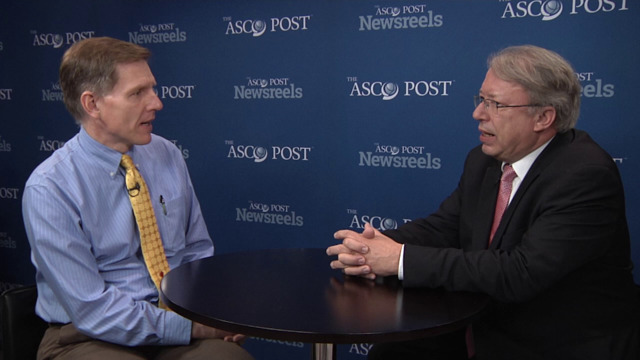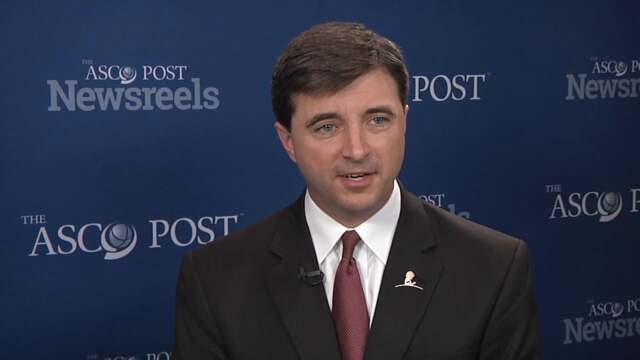Nicholas C. Turner, MD, PhD, and Clifford A. Hudis, MD, on Results of the PALOMA3 Study on Hormone Receptor–Positive, HER2 Negative Metastatic Breast Cancer
2015 ASCO Annual Meeting
Clifford A. Hudis, MD, of Memorial Sloan Kettering Cancer Center, and Nicholas C. Turner, MD, PhD, of the Royal Marsden Hospital NHS Trust, discuss fulvestrant and palbociclib as a treatment option in pre- and postmenopausal women with hormone receptor–positive, HER2-negative metastatic breast cancer that has progressed on prior endocrine therapy (Abstract LBA502).
Related Videos
Richard G. Margolese, MD, and Robert W. Carlson, MD
Robert W. Carlson, MD, of the National Comprehensive Cancer Network, and Richard G. Margolese, MD, of McGill University, discuss the improvement in breast cancer–free interval with anastrozole vs tamoxifen in patients with ductal carcinoma in situ undergoing lumpectomy plus radiotherapy (Abstract LBA500).
Claus Garbe, MD, and Anthony J. Olszanski, RPh, MD
Claus Garbe, MD, of the University of Tuebingen, and Anthony J. Olszanski, RPh, MD, of Fox Chase Cancer Center, discuss the survival of sentinel lymph node-positive melanoma patients with and without complete lymph node dissection (Abstract LBA9002).
Andrew Zelenetz, MD, PhD
Andrew Zelenetz, MD, PhD, of Memorial Sloan Kettering Cancer Center, discusses two important lymphoma trials presented at ASCO and his views on whether their results are indeed practice-changing (Abstract 8504 and LBA8502).
Tony Mok, MD, and James O. Armitage, MD
James O. Armitage, MD, of the University of Nebraska Medical Center, and Tony Mok, MD, of The Chinese University of Hong Kong, discuss oncology from an international point of view.
Gregory T. Armstrong, MD, MSCE
Gregory T. Armstrong, MD, MSCE, of St. Jude Children's Research Hospital, discusses the findings of a landmark survivorship study (Abstract LBA2).





